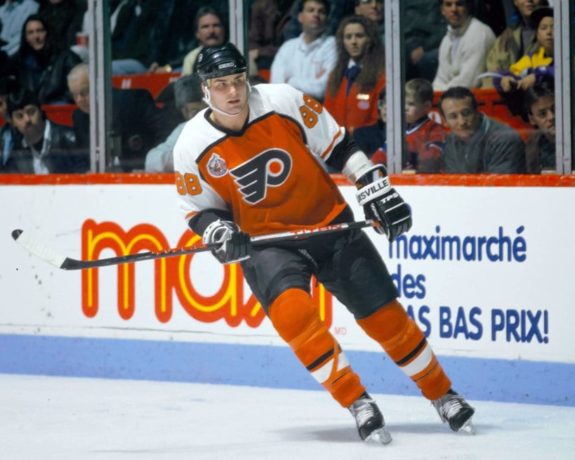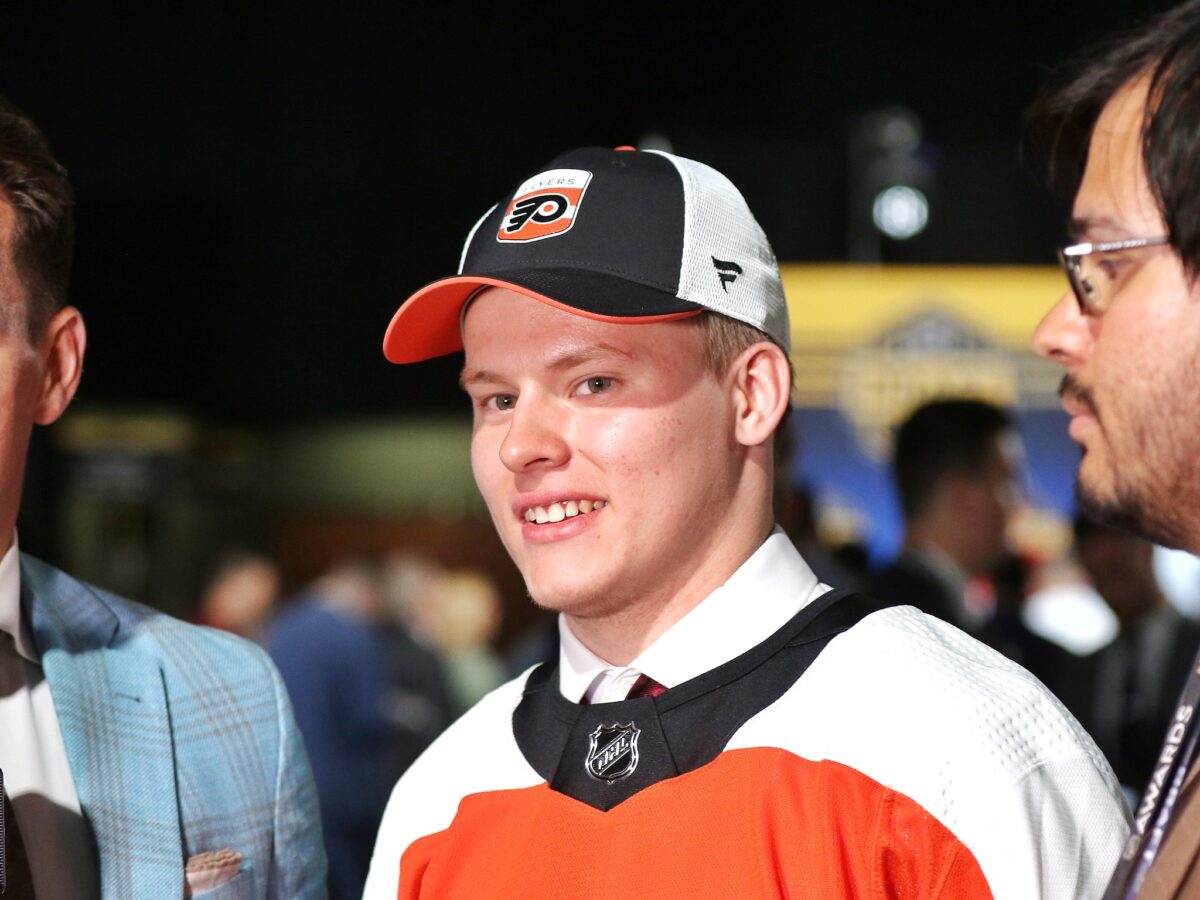Nothing is certain yet, but it’s looking like 19-year-old prospect Matvei Michkov will be a member of the Philadelphia Flyers in 2024-25. He is the type of talent that every rebuilder hopes to end up getting—he is one of the best prospects that the Flyers have ever had. Aside from how good he is as a player at such a young age, he ultimately represents something far bigger.
In the somewhat recent past, the Flyers have not done their superstars justice in their attempts to bring Philadelphia its first Stanley Cup since 1975. Michkov, more than anything, represents a chance at redemption. This time, the Flyers cannot afford to fail.
Flyers’ Shortcomings with Lindros
After nearly two decades of not having an offensive superstar, Eric Lindros became available for trade. Since the Flyers were amid a rebuild, they stopped at nothing to acquire the next big thing in Philadelphia. He brought an incredible level of talent, youth, leadership, and size. The Orange and Black had their next franchise-altering talent, and it was an opportunity to end their Stanley Cup drought.

The Flyers did a pretty good job of acquiring talent for him to play with, which gave him and his team a high ceiling. By the time the Flyers exited their rebuild around the mid-1990s and were truly ready to win games, Lindros had one of the best peaks in franchise history. Winning the Hart Trophy and leading the league in points in 1994-95, he lived up to every single expectation and more. While Philadelphia lost in the Eastern Conference Final to the New Jersey Devils that season, it was clear that there was a lot to look forward to.
However, there was a catch. Lindros was notoriously prone to concussions in an era where, frankly, head injuries and ailments in general were not taken very seriously. The Flyers didn’t put enough emphasis on making sure their superstar was both happy and healthy, but we’ll revisit this point in a little bit.
Related: Philadelphia Flyers’ 1990s Rebuild: Decisions, Winning, & Collapse
Despite the injuries, the Flyers made the Stanley Cup Final in 1997, led by Lindros’ 23-point playoff run in 15 games to that point. Facing one of the greatest teams ever assembled, the Detroit Red Wings, the Orange and Black fell apart and were no match—they were swept. In the end, this was the furthest that they got in the Lindros era.
The Flyers were still a very good team during Lindros’ reign after their loss in the Final, but the injuries continued for him. It all reached a breaking point in the 1998-99 season when he suffered a collapsed lung that was undetected by medical staff, and he could have died as a result—it was an organizational nightmare. After that, his time in Philadelphia—and the NHL—did not last for much longer. Without him for the entire 2000 postseason, Philadelphia rallied for him to take a 3-2 series lead in the Eastern Conference Final against those pesky Devils by the time he returned. Being stripped of his captaincy in the midst of all of this, this was his chance to finally break through. Then, the hit happened.
In Game 7 against the Devils with an appearance in the Stanley Cup Final on the line, Lindros was decked in the middle of the ice by Scott Stevens—that would be his last moment on the ice as a Flyer after just recovering from injury. The contest was knotted up until very late in the third period, but New Jersey pulled away and eventually won the Stanley Cup. Completely demoralized, the Flyers had suffered arguably the most devastating loss in franchise history.
While the Flyers built some fantastic teams around Lindros that allowed him to flourish, his lack of availability limited their ceiling. This shouldn’t be entirely blamed on the organization, but Lindros was a player that they were meant to protect. Instead, his tenure was filled with toxicity between him and general manager (GM) Bobby Clarke. The Orange and Black had failed their generational talent.
Flyers Unable to Build Around Giroux
After Lindros, the Flyers got a gift. Selected with the 22nd overall pick in the 2006 NHL Draft, Clarke snagged Claude Giroux. It would take him some time to emerge as a true franchise star, but when he did, it was reminiscent of the level of player that Lindros was—at his peak, Giroux was a superstar.
By the time he took the next step, however, the Flyers were already tearing their team down. After Giroux led them in points in 2010-11 and had an impressive—yet somewhat short—playoff run, new GM Paul Holmgren tore it down. He sent star forwards Mike Richards and Jeff Carter away, acquiring some young players to save cap space. Ultimately, this was a decision that evaporated the Flyers’ Stanley Cup window.
Philadelphia, being led by a 36-year-old Kimmo Timonen and a 37-year-old Chris Pronger on their defense in 2011-12, weren’t in a spot for a retool—their window for a championship could only last so long. When Pronger suffered a gruesome eye injury on Oct. 24, 2011, it essentially meant the end of his career—he played in five more games and then never touched the ice again. Despite losing their captain and a major anchor of their defense, the Flyers managed to play quite well for the rest of the season mainly because of Giroux’s excellence. Scoring 93 points in 77 games and finishing fourth in Hart Trophy voting, his superstardom was evident at age 24. Even with one of the best first-round playoff series ever recorded in NHL history with 14 points in six games for Giroux, his club lost in the second round.
After that 2011-12 campaign, the Flyers were never the same again. Giroux, who was named the team’s captain for the 2012-13 season, continued to shine for years. The same could not be said for the team around him. Even former teammates of his will tell you that, quite simply, they were never built to contend. The Flyers took it slow regarding a team-building process during their captain’s prime as they entered multiple retooling efforts, which probably would have been a death sentence for a normal player. However, Giroux was nothing but consistently elite with the Orange and Black.
By the time the Flyers had accumulated highly regarded prospects who were at an age where they were ready for the NHL, Giroux was still the player of old. Scoring 102 points in his age-30 season and finishing second in points out of everyone in the league, the Flyers’ plan ironically worked to perfection—except it didn’t. The prospects they drafted never panned out, and it was all up to the veterans to make a championship happen. The closest they came was in 2019-20 where they made it to Game 7 of the second round.
After the Flyers’ loss in the second round, everything collapsed and they became one of the worst teams in the NHL by 2021-22. At age 34, Giroux was traded to the Florida Panthers with 900 points in exactly 1,000 games with Philadelphia. Officially, his long reign with the Flyers came to a close.
Being at least fourth in points for a decade is an accolade that has a 100 percent Hockey Hall of Fame induction rate among eligible players going all the way back to the 1910s—Giroux was one of those athletes in the 2010s. Unfortunately, he didn’t have a team that was even close to championship-caliber for almost the entirety of that era. The Orange and Black didn’t learn their lesson from Lindros—they failed their superstar again.
Can the Flyers Learn From Their Mistakes?
From this point forward, the Flyers’ mission is pretty evident. Everything they do should be to build around and support their teenage star. Every draft pick, trade, extension, and free-agent signing should be made considering how it might affect Michkov in the short- and long-term future. He is their franchise piece, and that’s something that needs to be crystal clear.

Michkov is a superstar prospect, and the Flyers need to treat him like one. The 1990s were a way different time than today, so we probably won’t have to worry about injuries completely destroying his career. However, building a contending team around him could be an issue. For him to succeed, he needs to have players around him—a long-term plan will be needed for that. Instead of going with the flow like they did with Giroux, Philadelphia will need to know how they want to approach this new era.
Of course, Michkov is not a guaranteed superstar. Assuming that he will have the peak of Lindros or Giroux is silly (even if he does have the numbers to back it up), but the major takeaway is about what he represents. This is the next chance for the Flyers to give a player with infinite potential everything that he needs to succeed.
With Michkov, failure is not an option. The Orange and Black can repent their sins in their past by doing everything in their power to give one of the best prospects that they have ever had a chance to shine. Can GM Danny Briere do what others before him have been unable to?
